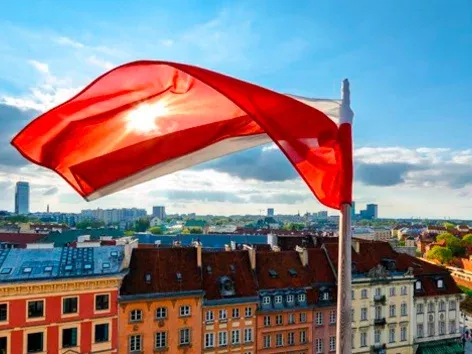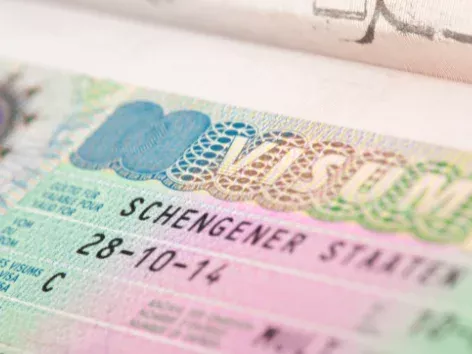“Uscita dalla protezione temporanea”: Avvocato di Visit Ukraine sui cambiamenti nella politica migratoria dell'UE e sul futuro degli ucraini all'estero
- Dove vanno più spesso gli ucraini per ottenere un permesso di soggiorno o la residenza permanente al giorno d'oggi?
- Cosa cambierà nella politica dell'UE nel 2025?
- Perché la protezione temporanea non è una garanzia di permesso di soggiorno o residenza permanente?
- Cosa stanno facendo gli ucraini: tornare o legalizzarsi?
- Come possiamo aiutare: supporto legale per gli ucraini all'estero

L'UE prevede di abolire la protezione temporanea e gli ucraini dovranno cercare nuovi modi per legalizzarsi. In questo articolo, l'avvocato di Visit Ukraine Anna Fedoryshyna spiega cosa sta succedendo e come agire ora. Scopri quali paesi rimangono attraenti, da dove iniziare la legalizzazione e cosa fare per evitare di essere “fuori legge”
La guerra è ancora in corso e milioni di ucraini rimangono all'estero, compresi nell'Unione Europea, che ha concesso loro un meccanismo legale senza precedenti dal 2022: protezione temporanea. Questo status è stata una soluzione salvavita, ma temporanea. Già nel 2025, l'UE parla già di una "strategia di uscita", e gli stati membri parlano sempre più di deportare coloro che non riescono a legalizzarsi.
Abbiamo parlato con Anna Fedoryshyna, un'avvocato specializzato in migrazione di Visit Ukraine, riguardo ai paesi più attraenti per la legalizzazione, cosa sta cambiando nella politica europea e come agire per evitare di essere privati dei diritti. Consiglia gli ucraini in tutto il mondo quotidianamente e sa come sta cambiando la situazione migratoria dall'interno.
Dove vanno più spesso gli ucraini per ottenere un permesso di soggiorno o la residenza permanente al giorno d'oggi?
“Germania, Polonia e Repubblica Ceca rimangono i paesi più popolari per la legalizzazione tra gli ucraini,” spiega Anna, "E ciò che è importante è che le persone non rimangono più semplicemente sotto protezione temporanea, ma passano a stati a lungo termine".
Secondo l'avvocato, questi paesi offrono meccanismi relativamente chiari per la legalizzazione - attraverso l'occupazione, l'istruzione, il business o la partecipazione a programmi di integrazione. E soprattutto, è qui che sempre più ucraini iniziano a richiedere un permesso di soggiorno nazionale, che in futuro consente loro di ottenere la residenza permanente.
"In Germania, il numero di domande per un permesso di soggiorno per lavoro è aumentato significativamente. Inoltre, molti ucraini richiedono la Blue Card, che è un'opzione per professionisti altamente qualificati. In Polonia, il motivo predominante per richiedere una carta di soggiorno è il lavoro e il ricongiungimento familiare. E in Repubblica Ceca, i programmi educativi e i visti di lavoro sono popolari," aggiunge.
La tendenza chiave degli ultimi anni è un cambiamento di enfasi da stati umanitari a immigrazione a pieno titolo. Gli ucraini stanno sempre più richiedendo non solo per se stessi, ma anche per i loro figli, partner e genitori. Cioè, stanno prendendo la decisione di rimanere nell'UE a lungo termine.
Cosa cambierà nella politica dell'UE nel 2025?
Anna spiega che quest'anno l'Unione Europea potrebbe cambiare le regole del gioco:
"La Commissione Europea ha sviluppato un nuovo piano di deportazione per coloro a cui è stato negato l'asilo. Si sta considerando la possibilità di detenzione fino a due anni. Inoltre, i paesi dell'UE stanno già discutendo l'abolizione della protezione temporanea per gli ucraini, che, ricordo, è valida almeno fino a marzo 2026".
Ufficialmente, la Direttiva è stata prorogata fino al 2026, ma, secondo Anna, già nell'estate del 2025 (in particolare, durante la riunione del Consiglio Europeo di giugno), potrebbe essere discusso un "piano di smantellamento". Per gli ucraini, questo significa una cosa: non possiamo più aspettare.
Non vuoi perdere aggiornamenti importanti e articoli utili? Iscriviti alla nostra newsletter settimanale!
Perché la protezione temporanea non è una garanzia di permesso di soggiorno o residenza permanente?
"La protezione temporanea non è un permesso di soggiorno. È un meccanismo temporaneo e umanitario. Non conta come residenza legale nella maggior parte dei paesi quando si tratta di residenza permanente.", - spiega l'avvocato.
Per legalizzarsi, gli ucraini devono cambiare il loro status. Ci sono opzioni: occupazione ufficiale, studio, imprenditorialità, ricongiungimento familiare. Ma ovunque ci sono requisiti rigorosi: un reddito stabile, alloggio, competenze linguistiche. E soprattutto, in alcuni paesi (come Germania o Polonia), il periodo di protezione temporanea non conta ai fini della durata totale di residenza richiesta per la residenza permanente.
"Più ci si avvicina alla fine del programma di protezione, più persone rimarranno nella zona grigia. Perdere il proprio status significa affrontare la minaccia di deportazione o perdere l'accesso all'assistenza sanitaria, all'istruzione e al lavoro. Pertanto, ti consigliamo di richiedere un permesso di soggiorno ora, senza aspettare il 2026.", - sottolinea Anna.
Tra l'altro, puoi leggere di più sul futuro della protezione temporanea, così come gli scenari e i rischi esistenti, nella nostra precedente intervista con l'esperto.
Cosa stanno facendo gli ucraini: tornare o legalizzarsi?
Attualmente ci sono tre principali aree di comportamento:
1. Integrazione all'estero: Molti di coloro che sono stati nell'UE per lungo tempo stanno pianificando di rimanere. Soprattutto in Germania, Polonia e Repubblica Ceca - le persone hanno già messo radici.
2. Ritorno in Ucraina: Alcune persone stanno tornando, soprattutto se hanno familiari in Ucraina o hanno perso il lavoro/l'alloggio all'estero.
3. Legalizzazione in paesi terzi: Ci sono coloro che cercano di richiedere programmi in Canada, Stati Uniti e Australia. Questo richiede supporto aggiuntivo, consulenza e documenti.
"Ogni storia è unica. Ma ciò che è comune è che gli ucraini hanno bisogno di supporto legale. Perché i sistemi dell'UE sono complessi e un errore nei documenti o nei termini può essere molto costoso."
Come possiamo aiutare: supporto legale per gli ucraini all'estero
Gli avvocati di Visit Ukraine supportano gli ucraini nella loro legalizzazione all'estero - dalla consulenza iniziale alla preparazione completa dei documenti per un permesso di soggiorno, visto di lavoro o studio. I nostri specialisti lavorano con Germania, Polonia, Repubblica Ceca, Spagna, Canada, Stati Uniti e altri paesi.
● Vuoi rimanere nell'UE dopo la scadenza della tua protezione temporanea?
● Non sei sicuro di come preparare i documenti per un permesso di soggiorno o adattarti ai requisiti del paese?
● Hai bisogno di aiuto con un contratto di lavoro o di studio?
Contatta gli avvocati di Visit Ukraine - i nostri specialisti troveranno una soluzione!
Ti ricordiamo! Il governo ceco sta considerando la possibilità di terminare la protezione temporanea per i rifugiati ucraini in caso di un cessate il fuoco a lungo termine in Ucraina. Il Ministro dell'Interno Vit Rakusan ha annunciato piani per inasprire la procedura di asilo e introdurre nuovi approcci all'accoglienza dei veterani di guerra. Leggi come questo potrebbe influenzare gli ucraini nella Repubblica Ceca nel nostro articolo precedente.
Foto: Freepik
Vuoi saperne di più? Leggi le ultime notizie e materiali utili sull'Ucraina e il mondo nella sezione Notizie .
La nostra raccomandazione per un viaggio sicuro e confortevole:
Visit Ukraine Insurance - assicurazione per un soggiorno sicuro all'estero senza spese inutili;
Green Card - assicurazione auto obbligatoria per viaggiare all'estero;
Visit Ukraine Tickets - prenota biglietti per autobus, treni e aerei da/per l'Ucraina e tra le città di tutto il mondo;
Servizio Avvocato Privato - supporto legale professionale su questioni di visto e migrazione;
Visit Ukraine Merch - acquista abbigliamento e accessori patriottici con consegna in tutto il mondo.
© 2018-2025, Visit Ukraine. L'uso, la copia o la ristampa dei materiali su questo sito è consentito solo con un link (iperlink per pubblicazioni online) a Visit Ukraine.
Tutti i diritti riservati.
Recommended articles
1 min
For refugees
Cambierà l'atteggiamento della Polonia nei confronti degli ucraini dopo le elezioni?
Dopo le elezioni presidenziali in Polonia, sono emerse molte domande riguardo al futuro dei rifugiati ucraini. Scopri di più sulla posizione dell'Ambasciata polacca riguardo ai cambiamenti nel sistema di assistenza sociale, cosa aspettarsi dalle autorità polacche nel prossimo futuro e come questo influenzerà la vita degli ucraini in Polonia
20 mag. 2025
More details1 min
For refugees
Trump vuole deportare 200.000 ucraini dagli Stati Uniti: sono pronti a essere pagati per andarsene
La politica dell'amministrazione Trump sugli immigrati prevede il rapido ritorno dei rifugiati nei loro paesi d'origine. Un piano recentemente sviluppato stabilisce che circa 200.000 ucraini dovranno lasciare gli Stati Uniti. Scopri come il governo americano intende influenzare il desiderio dei rifugiati di lasciare il paese
20 mag. 2025
More details2 min
For refugees
La Germania si sta preparando a inasprire la sua politica migratoria basata sul modello della Danimarca. Scopri come questo potrebbe influenzare i rifugiati ucraini, il sistema di asilo e il mercato del lavoro
26 mag. 2025
More details1 min
Travel
Quali paesi Schengen hanno introdotto controlli alle frontiere: restrizioni nel 2025
Nel 2025, i paesi Schengen continuano ad affrontare sfide che richiedono il ripristino dei controlli alle frontiere. Queste misure mirano a migliorare la sicurezza e gestire i flussi migratori. Scopri quali paesi hanno restrizioni in atto
08 lug. 2025
More details
